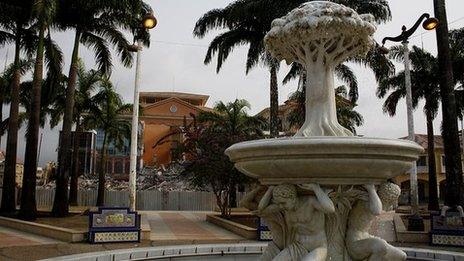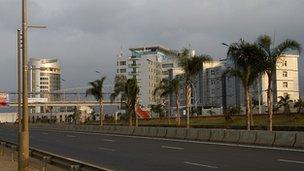Malabo Blues: A poet's challenge to preserve a city
- Published

Malabo's Cathedral Square has seen some big changes recently
Cesar Mba Abogo is a poet with two huge ambitions - to use his work to preserve for future generations the image of a city that is being transformed at a blinding speed, and to build the first book shop in Equatorial Guinea.
The relatively little known Spanish-speaking country off the west coast of central Africa used to be one of the poorest in the region but has been going through enormous changes since oil was discovered in the mid-1990s.
New buildings are mushrooming everywhere and some beautiful old ones are being destroyed, the quality of the roads might make you think you are in France or Switzerland, and the ubiquitous CCTV cameras in the capital, Malabo, might remind you of London.
In spite of the frequent accusations made abroad of human right violations and corruption in the former Spanish colony, many young people are returning to their country in order to profit from the booming economy and to help rebuild their nation.
It is believed that nearly one third of the population was killed or forced to leave the country in the 10 years of terror that followed independence in 1968, when an elected president, Francisco Macias Nguema, became one of the most ruthless leaders the world has known.
Some came back and many others left after Macias was overthrown in 1979 by one of his nephews, current President Teodoro Obiang Nguema Mbasogo.
Mba moved to Europe to study when he was 17 and returned four and a half years ago. He is now 33.
"I came back because I found that I can have more opportunities in my country than in Spain, where I was at the time," he told BBC Africa, at his home in central Malabo.
"And I came back because as a writer, as a poet, I found that I wasn't able to explain my identity very well. I was in Spain writing about what it is being an African guy in Europe but at a certain point I was completely contaminated by this European environment.
"I was saying that I'm African but actually my situation was quite different from that of the African I was seeing in Barcelona, the guy that was coming from Mali, from Senegal. I was black, I was Guinean, I was African but at a certain point I was integrated into the Spanish society."
Bringing about changes
An economist by training, Mba now works for the ministry of mines, industry and energy, and teaches economy of natural resources at the national university.
"Something that impressed me a lot is that my students - they want to be economists - but all of them when they knew that I am a writer they came to me, they were talking about different authors of Equatorial Guinea and about my books too, and they wanted to read them," he said.
However, to find literary works in the country is still difficult as there are no book shops in Malabo, which is located in the island of Bioko, or in Bata, the biggest city on the mainland.
Those who can, download books from the internet, bring them from abroad or read them at the recently opened national library or at the Spanish or the French cultural centres.
When I visited the national library, there were only two readers. The institution has a few kiosks in Malabo and Bata which sell books but the selection is limited to a handful of works.
There is also a new Guinean cultural centre in Malabo but sadly it does not seem to get enough attention from the authorities and it is virtually empty.
Mba, who loves books and knowledge, has decided that it is about time Malabo had a book shop and is building one.
As he told me, he and his friends are not sitting on their hands and waiting for changes to materialise.
"We are trying to bring about changes and to make a real contribution to the country," he said.
Ruled from Argentina
In a very moving text, called (The Construction) of the Memory of Oil, the poet writes:
"Equatorial Guinea's history is so tragic that many witnesses, executioners and victims pretend to be cyclopes to avoid looking at each other closely. They play tirelessly, forget at the top of their voices, and codify the geometry of Equatorial Guinea's sighs to build a landscape with no questions and a future fit only for survivors."

Modern roads, new buildings and electricity are changing the face of Malabo
But he argues that the real tragedy of the country and its poets is not its history but their isolation. I asked him why.
"In the first book I wrote, El Portador de Marlow (Marlow's Porter), I have a poem, Las Soledades del Poeta, The Solitudes of the Poet, and the first thing I discovered when I came back to Malabo, I found, let's say the source of this solitude because Equatorial Guinea is a unique place in the world," he told me.
"We are in Africa, we speak Spanish in a continent where no other country speaks Spanish, we have a very complex history with Spain, we have been through different very dramatic experiences in our history, and people don't know about Equatorial Guinea.
"Now with the oil, with the money, everybody speaks about Equatorial Guinea but people don't really know Equatorial Guinea, and I think that the role of the artists, the writers, the poets, is to be able to write about ourselves, who we are."
Mba - who loves Latin American writers like Jorge Luis Borges, Gabriel Garcia Marquez, Cesar Vallejo and, above all, Chilean novelist and poet Roberto Bolano - is convinced that Equatorial Guinea could do better, artistically speaking, by becoming closer to Latin America, as it shares with most of it the Spanish language and a similar colonial past.
"We can cease our solitude by looking at Latin America and letting Latin America look at us.
"I went to Puerto Rico last year to a literary festival and schoolchildren there sing a song about Fernando Po, an island in Africa… In their cultural imaginary they have references to Fernando Po and Santa Isabel. We have to find a way to get really close so that they know that Fernando Po is now Bioko and Santa Isabel is Malabo," he said.
After all, as he mentions in one of his texts, Fernando Po was - at least nominally - governed from Buenos Aires towards the end of the 18th Century, as part of Spain's Rio de la Plata viceroyalty.
Looking ahead
Mba is very consciously writing for the future.
He says that during the most difficult moments of the past, writers were documenting what he calls Equatorial Guinea's memory of silence, and that his generation has now to write a memory of the oil boom.
"We have to be able to capture reality and write in a way that two decades ahead they'll be able to understand, by reading us, how was this time we are living in," he said.
"I don't live in the past but it doesn't mean I don't take the past into account. I do, but I think it's time for us to move forward."
So he goes around his beloved Malabo observing the changing city and taking mental notes.
"In a place like Malabo you have characters everywhere. The city itself is a character, the people in the city are characters," he told me.
In his most recent book, Malabo Blues, he gives voice to many of them.
"Things have changed and whoever doesn't see that, it is because he doesn't want to… We live in a democracy but nobody should expect it to be similar to Berlusconi's democracy. Ours is the one we need, at least for the moment. The future will tell," one of his characters, Protasio Nguema Bocheku, says.
"Equatorial Guinea's enemies get annoyed when they see that this country - without anyone's help - has taken totally alone the road to modernity. Many mistakes have been made and many more will certainly be made but, for God's sake, we have to be honest and applaud Equatorial Guinea," the character continues.
The narrator, a writer who like Mba has returned from exile, agrees that changes are taking place and says he hopes they will eventually benefit everyone but - trying to avoid sounding over-optimistic - adds that ultimately time will dispel all doubts.
"Has your writing changed since you came back?," I asked the poet.
"Of course. I think I have matured a little bit more because now I don't have as many contradictions as before, so I think I have evolved in the right direction."